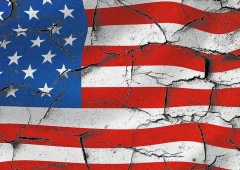Senators Push Fed for 0.75% Rate Cut to Prevent Recession
17.09.2024 9:30 1 min. read Alexander Stefanov
A group of Democratic senators, led by Elizabeth Warren, is pressing Federal Reserve Chair Jerome Powell to implement a significant reduction in interest rates to protect the U.S. economy.
In a letter sent to Powell, Senators Warren, Sheldon Whitehouse, and John Hickenlooper called for a 75-basis-point rate cut, warning that failure to act could increase the risk of a recession.
The senators argue that delaying rate cuts could push the economy into trouble, particularly affecting the labor market. They believe a more aggressive stance in the short term is necessary to avoid long-term economic challenges.
As the Fed prepares for its next policy meeting, there is widespread anticipation of a rate cut, though the size remains unclear. Investors and market watchers are speculating about potential cuts of 0.25% to 0.50%, while the senators are advocating for a larger 0.75% reduction. The senators’ call comes as inflation trends downward, nearing the Fed’s target of 2%, and the labor market shows signs of softening, which they argue justifies a bolder move.
The letter expresses concern that the Fed’s hesitance in cutting rates could harm the economy further, emphasizing the need for swift action. While a 75-basis-point cut would be a substantial shift, its effects on markets, particularly stocks and cryptocurrencies, could be significant, potentially boosting liquidity and investor sentiment.
-
1
Billionaire Warns of Slowing U.S. Growth, Sees 45% Chance of Downturn
20.05.2025 14:00 1 min. read -
2
China Quietly Advances Yuan as Dollar Alternatives Gain Ground
20.05.2025 17:00 2 min. read -
3
Economic Instability and Political Shift Fueling Bitcoin’s Rise – Galaxy Digital CEO
23.05.2025 12:00 2 min. read -
4
Trump Renews Attack on Fed Chair, Calls for Immediate Rate Cuts
18.05.2025 8:00 1 min. read -
5
Japan’s Inflation Hits 3.5% as Food Prices Soar and Tariff Risks Loom
23.05.2025 21:00 1 min. read
Tariffs Threaten to Stall U.S. Growth in 2025, Recovery Not Expected Until 2026
The U.S. economy may be closer to a downturn than many realize, according to Jay Bryson, chief economist at Wells Fargo.
Dollar Faces Deep Decline as Fed Cuts Pressure Currency, Warns Morgan Stanley
Morgan Stanley has issued a cautionary outlook on the U.S. dollar, predicting a major decline over the coming year as Federal Reserve rate cuts take hold.
Trillions in Debt Payments Could Break U.S. Economy, Ray Dalio Predicts
Legendary investor Ray Dalio has issued a stark warning about the trajectory of U.S. government finances, suggesting the country is drifting toward a series of severe economic shocks unless its debt spiral is urgently addressed.
Wall Street Veteran Warns Tariffs Could Disrupt AI-Driven Market Rally
Steve Eisman, the famed investor known for forecasting the 2008 housing collapse, is sounding the alarm—not on overvalued tech stocks or interest rates, but on the escalating risk of global trade disputes.
-
1
Billionaire Warns of Slowing U.S. Growth, Sees 45% Chance of Downturn
20.05.2025 14:00 1 min. read -
2
China Quietly Advances Yuan as Dollar Alternatives Gain Ground
20.05.2025 17:00 2 min. read -
3
Economic Instability and Political Shift Fueling Bitcoin’s Rise – Galaxy Digital CEO
23.05.2025 12:00 2 min. read -
4
Trump Renews Attack on Fed Chair, Calls for Immediate Rate Cuts
18.05.2025 8:00 1 min. read -
5
Japan’s Inflation Hits 3.5% as Food Prices Soar and Tariff Risks Loom
23.05.2025 21:00 1 min. read


